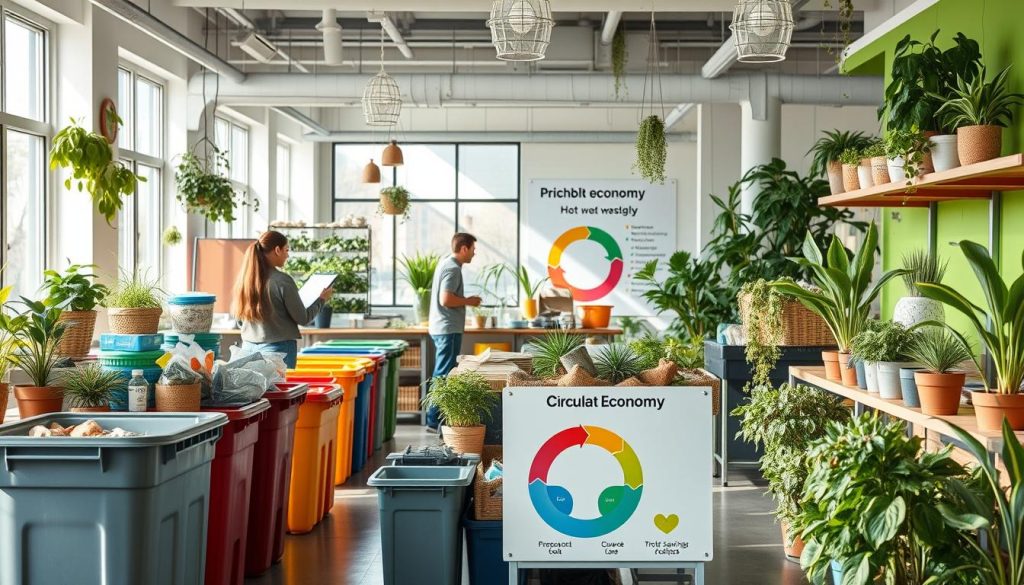I’m excited to share how zero waste practices can fatten your wallet. By cutting down on waste, we’re not just helping the planet. We’re also unlocking serious cost savings. It’s a win-win situation that I’m eager to explore with you.
Zero waste isn’t just a trendy phrase. It’s a practical approach to living that can lead to real financial benefits. From reducing household expenses to creating new income streams, the potential for savings is huge. Let’s dive into how waste reduction can boost your bottom line and contribute to a more sustainable future.
In this article, I’ll guide you through the various ways zero waste practices can improve your financial health. We’ll look at immediate cost savings, long-term benefits, and even how businesses are profiting from this eco-friendly approach. Get ready to discover how going green can put more green in your pocket!
Understanding Zero Waste: A Path to Financial Freedom
Zero waste is more than a trend. It’s a way to save money and help the planet. By following zero waste, you can make your money go further and support the environment.
Defining Zero Waste and Its Principles
Zero waste means no trash goes to landfills or oceans. It’s about using resources wisely and reducing waste. The main ideas are to buy less, reuse, recycle, and compost.
The Connection Between Waste Reduction and Economic Gains
Less waste means saving money on things we don’t need. It also cuts down on disposal costs. Buying in bulk and fixing things instead of throwing them away can save a lot.
How Zero Waste Aligns with Sustainable Living
Zero waste fits perfectly with living sustainably. It reduces our harm to the environment and saves resources. By doing this, we help the planet and save money, making it good for both our wallets and the Earth.
Immediate Cost Savings Through Waste Reduction
I’ve found that cutting down on waste can save a lot of money. Eco-friendly practices help both people and businesses save right away. Let’s look at some easy ways to manage waste and save money.
Reducing food waste is a big money-saver. Meal planning and better storage can cut grocery costs by 25%. Businesses can also save by composting, which lowers waste fees and makes good soil.
Conserving energy is another way to save. Using LED bulbs and smart power strips can cut electricity bills by 10-20%. Offices can save hundreds by turning off computers at night.
Conserving water also saves money. Fixing leaks and using low-flow fixtures can cut water bills by 15-20%. Businesses can save a lot by recycling water.
| Waste Reduction Strategy | Potential Cost Savings | Environmental Impact |
|---|---|---|
| Food waste reduction | 25% on grocery bills | Less landfill methane emissions |
| Energy conservation | 10-20% on electricity bills | Reduced carbon footprint |
| Water conservation | 15-20% on water bills | Preservation of water resources |
By adopting these eco-friendly habits, I’ve seen big savings. These practices not only save money but also help our planet.
Long-Term Financial Benefits of Zero Waste Practices

Adopting zero waste practices can lead to big financial gains. These gains are linked to both environmental care and economic growth. Let’s see how cutting down on waste can help our money and communities.
Reduced Expenses on Waste Management
Effective waste management can save a lot of money. Cities that go zero waste spend less on waste pickup and disposal. This saved money can go back into the community or lower taxes.
Lower Utility Bills and Resource Costs
Zero waste living means using resources better. My utility bills have gone down as I’ve used less. This is true for both homes and businesses, saving money and helping the planet.
Increased Property Values in Zero Waste Communities
Clean, zero waste communities are more appealing. This makes property values go up. Eco-friendly areas attract people and businesses who care about the environment, boosting the local economy.
Zero waste living is good for our money and the planet. It shows that caring for the environment can also grow our economy.
Financial Benefits of Zero Waste for Businesses

I’ve seen how businesses gain big by going zero waste. It’s good for the planet and their profits too.
Companies are finding out that cutting waste saves money. They use less stuff and work smarter. This saves on buying materials and getting rid of waste. It’s all about using resources well, over and over again.
Here are some ways businesses save money with zero waste:
- Less money spent on raw materials
- Lower costs for waste management
- Work more efficiently
- Look better to customers who care about the planet
- Make money from recycling
Let’s see some numbers. A medium-sized factory could save this much by going zero waste:
| Area | Annual Cost Savings |
|---|---|
| Raw Material Purchases | $50,000 – $100,000 |
| Waste Disposal | $20,000 – $40,000 |
| Energy Efficiency | $15,000 – $30,000 |
| Water Conservation | $5,000 – $10,000 |
| Total Potential Savings | $90,000 – $180,000 |
Zero waste is a smart move for businesses. It saves money and helps the planet. It’s a choice that’s good for everyone.
Creating New Revenue Streams Through Upcycling and Recycling

Upcycling and recycling are great ways to make money and cut down on waste. They help the planet and create jobs that are good for the environment. Plus, they boost local economies.
Turning Waste into Profitable Products
Upcycling turns old stuff into something new and valuable. I’ve seen people make cool furniture from pallets, fashion items from plastic bottles, and art from old electronics. These items sell well in places that care about the environment.
Exploring Markets for Recycled Materials
Recycling creates new markets for materials that would otherwise end up in landfills. Recycled plastics, metals, and paper are wanted by many industries. They help companies save money and meet their green goals.
Success Stories in Zero Waste Entrepreneurship
Entrepreneurs who focus on zero waste are doing well. TerraCycle has made a big recycling network for hard-to-recycle items. Patagonia’s Worn Wear program fixes and sells used clothes. These stories show that being green and making money can go together, creating more jobs in the circular economy.
Government Incentives and Tax Benefits for Zero Waste Initiatives
Government support for zero waste efforts is growing. They offer incentives and tax breaks to help the environment and boost the economy. These programs aim to encourage better waste management among individuals and businesses.
Local governments give grants for zero waste projects. These funds help start new ideas that cut waste and create jobs. Some cities also give rebates for compost bins or rain barrels, making it simpler to handle organic waste at home.
Tax credits are a big help too. Businesses can get deductions for buying recycling gear or starting waste reduction plans. This saves money and pushes for new waste management tech.
Here’s a breakdown of common incentives:
- Property tax exemptions for green buildings
- Sales tax exemptions on recycling equipment
- Income tax credits for waste reduction initiatives
- Low-interest loans for environmental projects
| Incentive Type | Benefit | Impact |
|---|---|---|
| Grants | Direct funding for projects | Stimulates innovation |
| Tax Credits | Reduced tax liability | Encourages business investment |
| Rebates | Cash back on purchases | Promotes consumer participation |
Using these incentives, communities can cut waste, save money, and help the planet. It’s good for the environment and the economy.
The Role of Zero Waste in Boosting Local Economies
Zero waste efforts are key to growing local economies. By adopting eco-friendly habits, communities open up new chances for growth. This leads to sustainable development.
Job Creation in the Circular Economy
The circular economy brings green jobs in many fields. Places like recycling centers and repair shops hire locals. This supports the community and pushes for a greener future.
Stimulating Innovation and Green Technologies
Zero waste goals spark new green tech ideas. Entrepreneurs create products and services that help the planet and economy. This leads to big leaps in sustainability.
Attracting Eco-Conscious Consumers and Businesses
Places focused on zero waste draw in eco-aware shoppers and businesses. These groups look for places that share their values. This brings in money and strengthens green practices.
| Economic Impact | Traditional Economy | Circular Economy |
|---|---|---|
| Job Creation | Limited to existing industries | Expands into green sectors |
| Innovation | Focused on efficiency | Driven by sustainability |
| Consumer Appeal | Price-driven | Values-aligned |
Local economies can thrive by following zero waste principles. This shift not only creates jobs but also boosts innovation. It also draws in people and businesses that share these values.
Implementing Zero Waste Strategies for Personal Finance
Adopting zero waste practices has saved me a lot of money. By reducing waste, my monthly costs have gone down. It’s surprising how small changes can lead to big financial gains.
I buy things in bulk and choose items with less packaging. This cuts down on waste and saves money over time. Making my own cleaning products is also eco-friendly and cost-effective. These steps have made my home more efficient.
Another strategy is to fix and reuse items instead of buying new ones. This saves money and reduces waste. I’ve turned old t-shirts into cleaning rags and fixed appliances instead of replacing them. These actions have boosted my financial health and helped the environment.
These zero waste strategies have brought real cost savings and improved my finances. It’s a win-win – I’m helping the planet and saving money. I suggest trying these simple waste reduction tips.

